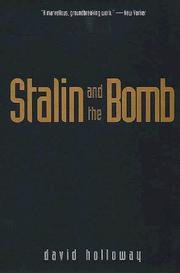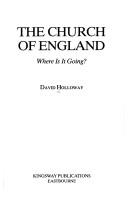| Listing 1 - 10 of 35 | << page >> |
Sort by
|
Book
ISBN: 0300029632 Year: 1983 Publisher: New Haven, Conn.
Abstract | Keywords | Export | Availability | Bookmark
 Loading...
Loading...Choose an application
- Reference Manager
- EndNote
- RefWorks (Direct export to RefWorks)
Polemology --- Russian Federation --- Arms race --- -World politics --- -#SBIB:327.5H21 --- 813 Methodologie --- 815 Geschiedenis --- 820 Internationale Betrekkingen --- 830 Economie --- 838 Duurzame Ontwikkeling --- 871 Conventionele wapens --- 872 Massavernietigingswapens --- 873 Wapenbeheersing --- 875 Defensiegerelateerde industrie --- 875.1 Onderzoek en ontwikkeling --- 876 Veiligheidspolitiek --- 876.1 Defensie --- 882.4 Noord-Amerika --- 884.1 Oost-Europa --- Colonialism --- Global politics --- International politics --- Political history --- Political science --- World history --- Eastern question --- Geopolitics --- International organization --- International relations --- Arms proliferation --- Proliferation of arms --- Security, International --- Arms control --- Arms transfers --- Disarmament --- Military readiness --- History --- -Vrede – oorlog, oorlogssituaties --- Soviet Union --- -Soviet Union --- -Armed Forces --- Defenses --- Military policy --- Russia --- World politics --- #SBIB:327.5H21 --- Coexistence (World politics) --- Peaceful coexistence --- Vrede – oorlog, oorlogssituaties --- Armed Forces. --- Defenses. --- Military policy.
Book
ISBN: 907050913X Year: 1984 Publisher: Amsterdam Jan Mets
Abstract | Keywords | Export | Availability | Bookmark
 Loading...
Loading...Choose an application
- Reference Manager
- EndNote
- RefWorks (Direct export to RefWorks)
Polemology --- International groups --- Russian Federation --- 623.4 --- 355 <47> --- 341.67 --- #SBIB:327.5H20 --- #SBIB:328H26 --- #SBIB:001.HIVA --- 355.02 <47> --- 355.003 <47> --- 658.8:623 <47> --- wapens - bewapening --- Defensie. Krijgskunst. Landsverdediging. Strijdkrachten. Krijgskunde--Rusland. Sovjet-Unie --- Ontwapening. Beperking ,vermindering van bewapening. Salt akkoorden. ABC akkoorden. Non-proliferatieverdragen. Oorlogspreventie --- Vredesonderzoek: algemeen --- Instellingen en beleid: USSR (actuele geschiedenis van de USSR: tot 1989) --- 341.67 Ontwapening. Beperking ,vermindering van bewapening. Salt akkoorden. ABC akkoorden. Non-proliferatieverdragen. Oorlogspreventie --- 355 <47> Defensie. Krijgskunst. Landsverdediging. Strijdkrachten. Krijgskunde--Rusland. Sovjet-Unie --- Russia

ISBN: 0300060564 9780300066647 Year: 1994 Publisher: New Haven Yale University Press
Abstract | Keywords | Export | Availability | Bookmark
 Loading...
Loading...Choose an application
- Reference Manager
- EndNote
- RefWorks (Direct export to RefWorks)
Polemology --- History of Eastern Europe --- International groups --- anno 1940-1949 --- anno 1950-1959 --- Russian Federation --- 327.5 <47+57> --- Internationale conflicten. Internationale spanningen. Internationale blokvorming. Veiligheidspolitiek--?<47+57> --- Nuclear energy --- Nuclear weapons --- Science and state --- Research --- History. --- Government policy --- 327.5 <47+57> Internationale conflicten. Internationale spanningen. Internationale blokvorming. Veiligheidspolitiek--?<47+57> --- Russia --- History --- Atomic weapons --- Fusion weapons --- Thermonuclear weapons --- Weapons of mass destruction --- No first use (Nuclear strategy) --- Nuclear arms control --- Nuclear disarmament --- Nuclear warfare --- Atomic energy --- Atomic power --- Energy, Atomic --- Energy, Nuclear --- Nuclear power --- Power, Atomic --- Power, Nuclear --- Force and energy --- Nuclear physics --- Power resources --- Nuclear engineering --- Nuclear facilities --- Nuclear power plants --- Research&delete& --- Government policy&delete& --- Soviet Union --- Foreign relations. --- Foreign relations --- Atomic weapons - Government policy - Soviet Union - History. --- Nuclear energy - Research - Soviet Union - History. --- Science and state - Soviet Union - History.
Book
ISBN: 0300032811 9780300032819 Year: 1985 Publisher: New Haven: Yale university press,
Abstract | Keywords | Export | Availability | Bookmark
 Loading...
Loading...Choose an application
- Reference Manager
- EndNote
- RefWorks (Direct export to RefWorks)
Arms race --- World politics --- History --- Coexistence (World politics) --- Peaceful coexistence --- Soviet Union --- Armed Forces. --- Defenses. --- Military policy. --- World politics - 1945 --- -Soviet Union - Military policy. --- Soviet Union - Defenses. --- Soviet Union - Armed Forces.
Book
ISBN: 0585361541 9780585361543 9780300164459 0300164459 0300060564 9780300060560 Year: 1994 Publisher: New Haven Yale University Press
Abstract | Keywords | Export | Availability | Bookmark
 Loading...
Loading...Choose an application
- Reference Manager
- EndNote
- RefWorks (Direct export to RefWorks)
For forty years the Soviet-American nuclear arms race dominated world politics, yet the Soviet nuclear establishment was shrouded in secrecy. Now that the Cold War is over and the Soviet Union has collapsed, it is possible to answer questions that have intrigued policymakers and the public for years. How did the Soviet Union build its atomic and hydrogen bombs? What role did espionage play? How did the American atomic monopoly affect Stalin's foreign policy? What was the relationship between Soviet nuclear scientists and the country's political leaders? This spellbinding book answers these questions by tracing the history of Soviet nuclear policy from developments in physics in the 1920s to the testing of the hydrogen bomb and the emergence of nuclear deterrence in the mid-1950s. In engrossing detail, David Holloway tells how Stalin launched a crash atomic program only after the Americans bombed Hiroshima and showed that the bomb could be built; how the information handed over to the Soviets by Klaus Fuchs helped in the creation of their first bomb; how the scientific intelligentsia, which included such men as Andrei Sakharov, interacted with the police apparatus headed by the suspicious and menacing Lavrentii Beria; what steps Stalin took to counter U.S. atomic diplomacy; how the nuclear project saved Soviet physics and enabled it to survive as an island of intellectual autonomy in a totalitarian society; and what happened when, after Stalin's death, Soviet scientists argued that a nuclear war might extinguish all life on earth. This magisterial history throws light on Soviet policy at the height of the Cold War, illuminates a central but hitherto secret element of the Stalinist system, and puts into perspective the tragic legacy of this program today-environmental damage, a vast network of institutes and factories, and a huge stockpile of unwanted weapons.
Russia & Former Soviet Republics --- Regions & Countries - Europe --- History & Archaeology --- HISTORY / Russia & the Former Soviet Union. --- Soviet Union --- Foreign relations. --- Foreign relations --- Nuclear weapons --- Nuclear energy --- Science and state --- Atomic energy --- Atomic power --- Energy, Atomic --- Energy, Nuclear --- Nuclear power --- Power, Atomic --- Power, Nuclear --- Force and energy --- Nuclear physics --- Power resources --- Nuclear engineering --- Nuclear facilities --- Nuclear power plants --- Atomic weapons --- Fusion weapons --- Thermonuclear weapons --- Weapons of mass destruction --- No first use (Nuclear strategy) --- Nuclear arms control --- Nuclear disarmament --- Nuclear warfare --- Government policy --- History. --- Research
Book
ISBN: 0748670777 1281785849 9786611785840 0748632417 9780748632411 9780748670772 9781281785848 6611785841 9780748633814 0748633812 9780748633807 0748633804 Year: 2008 Publisher: Edinburgh : Edinburgh University Press,
Abstract | Keywords | Export | Availability | Bookmark
 Loading...
Loading...Choose an application
- Reference Manager
- EndNote
- RefWorks (Direct export to RefWorks)
This interdisciplinary study of how 9/11 and the 'war on terror' were represented during the Bush era, shows how culture often functioned as a vital resource, for citizens attempting to make sense of momentous historical events that frequently seemed beyond their influence or control. Illustrated throughout, the book discusses representation of 9/11 and the war on terror in Hollywood film, the 9/11 novel, mass media, visual art and photography, political discourse, and revisionist historical accounts of American 'empire', between the September 11 attacks and the Congressional midterm elections in 2006. As well as prompting an international security crisis, and a crisis in international governance and law, David Holloway suggests the culture of the time also points to a 'crisis' unfolding in the institutions and processes of republican democracy in the United States. His book offers a cultural and ideological history of the period, showing how culture was used by contemporaries to debate, legitimise, qualify, contest, or repress discussion, about the causes, consequences and broader meanings of 9/11 and the war on terror.
September 11 Terrorist Attacks, 2001, in art. --- September 11 Terrorist Attacks, 2001, in literature. --- War on Terrorism, 2001-2009. --- Global Struggle Against Violent Extremism, 2001-2009 --- Global War on Terror, 2001-2009 --- GWOT, 2001-2009 (War on Terrorism) --- Terror War, 2001-2009 --- Terrorism War, 2001-2009 --- War against Terrorism, 2001-2009 --- War on Terror, 2001-2009 --- Military history, Modern --- Terrorism --- World politics --- Afghan War, 2001 --- -Iraq War, 2003-2011 --- Operation Enduring Freedom, 2001 --- -Prevention --- Afghan War, 2001-2021 --- Iraq War, 2003-2011 --- 11 septembre 2001, Attentats du (États-Unis) --- Dans la littérature. --- 11 septembre 2001, Attentats du (États-Unis) --- Dans la littérature. --- Littérature américaine --- 21e siècle --- Thèmes, motifs
Book
ISBN: 0249439743 Year: 1968 Publisher: London : Morgan-Grampian Books,
Abstract | Keywords | Export | Availability | Bookmark
 Loading...
Loading...Choose an application
- Reference Manager
- EndNote
- RefWorks (Direct export to RefWorks)
Novelists, English --- Romanciers anglais --- Biographie --- Galsworthy, John,
Book
Year: 1971 Publisher: London International institute for strategic studies
Abstract | Keywords | Export | Availability | Bookmark
 Loading...
Loading...Choose an application
- Reference Manager
- EndNote
- RefWorks (Direct export to RefWorks)
Book
Year: 1968 Publisher: London Morgan-Grampian
Abstract | Keywords | Export | Availability | Bookmark
 Loading...
Loading...Choose an application
- Reference Manager
- EndNote
- RefWorks (Direct export to RefWorks)

ISBN: 086065365X Year: 1985 Publisher: Eastbourne Kingsway publications
Abstract | Keywords | Export | Availability | Bookmark
 Loading...
Loading...Choose an application
- Reference Manager
- EndNote
- RefWorks (Direct export to RefWorks)
Anglican Communion --- Doctrines --- Church of England --- Doctrines.
| Listing 1 - 10 of 35 | << page >> |
Sort by
|

 Search
Search Feedback
Feedback About UniCat
About UniCat  Help
Help News
News